November 10 - 16: Costa Rica
20 November 2016 · Arjan Dwarshuis · 6612 × bekeken
PLEASE MAKE A DONATION NOW!
world.observation.org/arjan
www.arjandwarshuis.com/#biggestyear
November 10th THE OFFICIAL RECORD BREAKING DAY
Last evening I was picked up from San José airport by Pieter Westra – the owner of Aratinga Tours – and three of my best friends from the Netherlands, Maurits Munninghoff, Pieter van den Akker en Harry Markusse. They had been traveling already for a week through Costa Rica and decided to join my hard-core birding itinerary for three days. Hoping of course that they would be there when I officially broke the record following Clements taxonomy ...
At 3:30 AM we were on our way to El Copal, a fantastic little lodge surrounded by a reserve with mid-elevation Caribbean slope rainforest. Here we were greeted by three top Costa Rican birders, Juan Diego Vargas, Ernesto M. Carman and Christian Urena. I needed just 32 species to officially set a new world record.
We started off with one of the finest regional endemics, the beautiful Snowcap. A dazzling little purple-and-white Hummingbird. Over the course of the morning we saw a long list of amazing species mainly while having coffee at the veranda overlooking the forested hillsides. Best of these were Blue-and-gold Tanager and White-crested Coquette. For the vulnerable Tawny-chested Flycatcher and Black-headed Antthrush we had to venture a little deeper into the forest.
After breakfast and saying goodbye to Christian we headed towards Ujaras where we started a long and intensive search for the endemic Cabanis’s Ground-Sparrow, which we eventually found three hours later. Luckily we picked up a lot of other interesting new birds along the way.
At lunch I did the count and came to the conclusion that I needed only three new birds for the record. Wow, the moment of truth was upon us. At a huge flowering tree we found a male Black-crested Coquette, two more species to go…
At Finca Cristina – Ernesto’s residence – it had to happen… In this shaded coffee plantation – Ernesto reputedly makes one of the best coffees on the planet – we quickly found a White-eared Ground-Sparrow which meant that I had only one more bird to go for the official world record.
A Buffy-crowned Wood-Partridge started calling nearby. This was it! Five tense minutes followed, but eventually I managed to get fantastic looks at the partridge as it sat fully in the open for a couple of seconds. What a fantastic record breaking bird!
We had champagne and Cuban cigars – at two in the afternoon – and after saying goodbye to Ernesto and Juan Diego we headed up into the mountains towards Paradiso del Quetzal Lodge.
At the lodge we were joined by top guide Jorge Serano and in the last hour of daylight we managed to find an additional ten new species. However, the day was not yet finished as we had to track down some night birds with local specialist Erik. Dusky Nightjar came easy, right opposite the lodge. Bare-shanked Screech-Owl took a little more time, but we eventually managed fantastic views. The last bird was the hardest, the Ridgway’s Saw-Whet Owl. We tried a lot of different sites, but nowhere we got any response. Just as we had all given up and were already sitting in the car, Erik – who refused to give up – suddenly found one calling and half an hour later I suddenly found it in the torch (it had stopped calling so it was a big stroke of luck). What a memorable day!
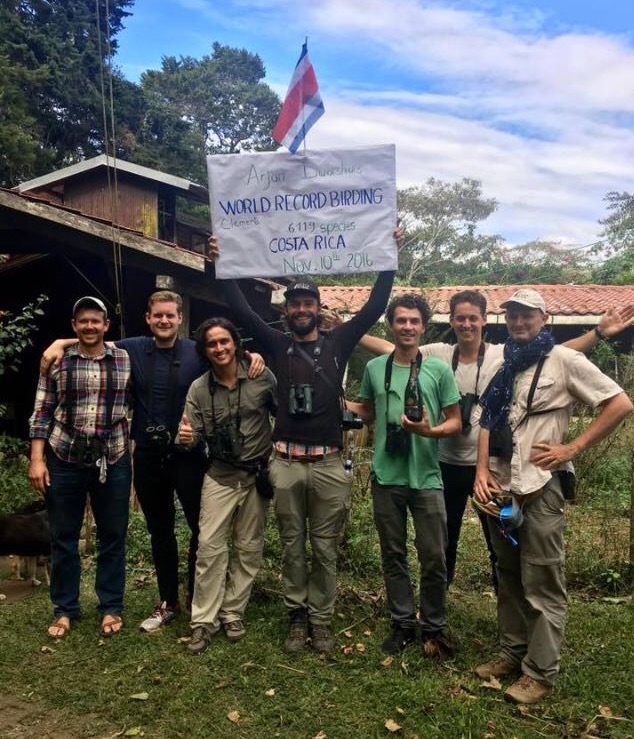
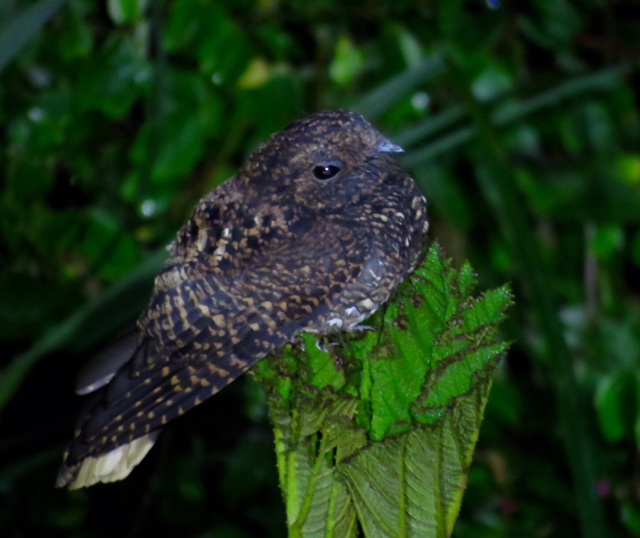
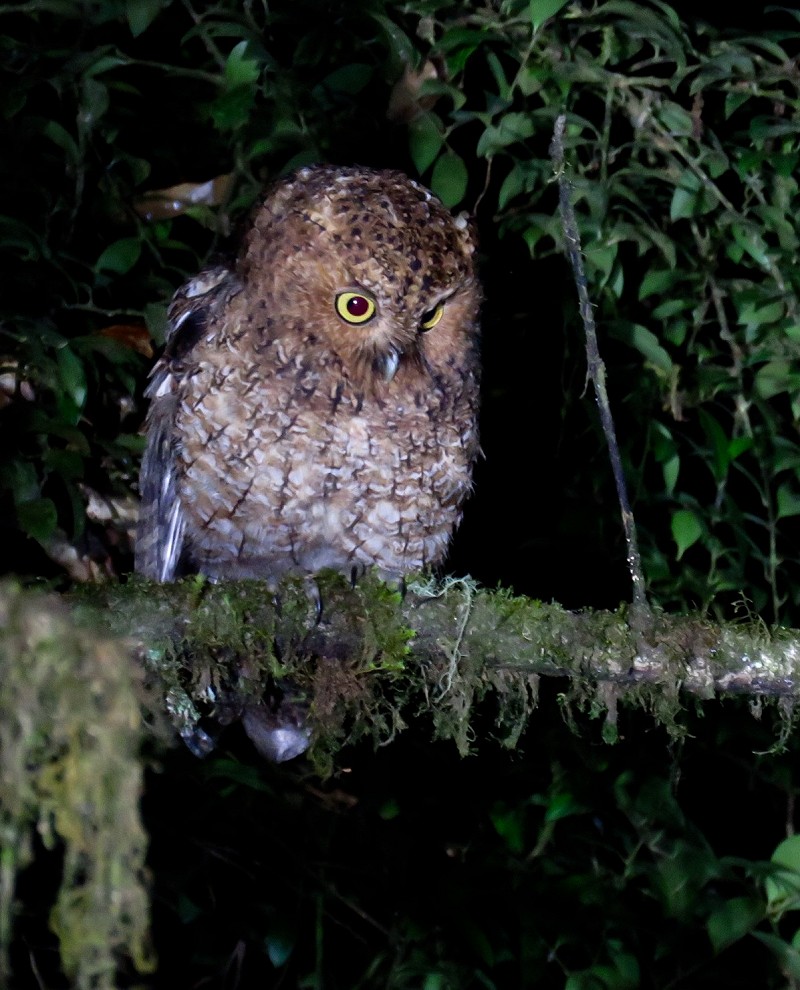
November 11th GOING VIRAL
After officially breaking the record yesterday, it turned out that the news had gone viral in the Netherlands. Subsequently I got phone calls from multiple radio and television shows to interview me about setting the new world record. So now and then our birding on the trails around Paraiso del Quetzal Lodge was interrupted by me having to give an interview over the phone. Luckily I had good cell phone reach in the middle of the forest.
Thanks to Jorge’s incredible local knowledge, we had a very productive pre-breakfast birding session with Wrenthrush, Silvery-fronted Tapaculo, Blue-throated Toucanet and, best of course, three exquisite Resplendent Quetzals, arguably the most beautiful bird in the world. For Harry, Pieter and Maurits this species was their most wanted bird for these two days of birding in Costa Rica, so they went crazy when we finally saw it. I must admit, so did I. The iridescent green colours, the long back feathers, the bright red belly. Simply amazing.
We kept on finding good birds after lunch, with highlights like both Silky-flycatchers, Timberline Wren and Buffy Tuftedcheek. When activity slowed down we drove up for my last visit to the paramo this year. Here we quickly found our two main targets, the secretive Peg-billed Finch and the near-endemic Vulcano Junco.
In the late afternoon we were very lucky to find a covey of Spotted Wood-Quails, all thanks to Jorge's incredible local knowledge that is.
From Paraiso del Quetzal Lodge we drove down to the nice Bosque del Tolomuco lodge, where we spent the night. We got a warm welcome from Liz and Ralf, the friendly Canadian owners of this place in the Pacific subtropics.
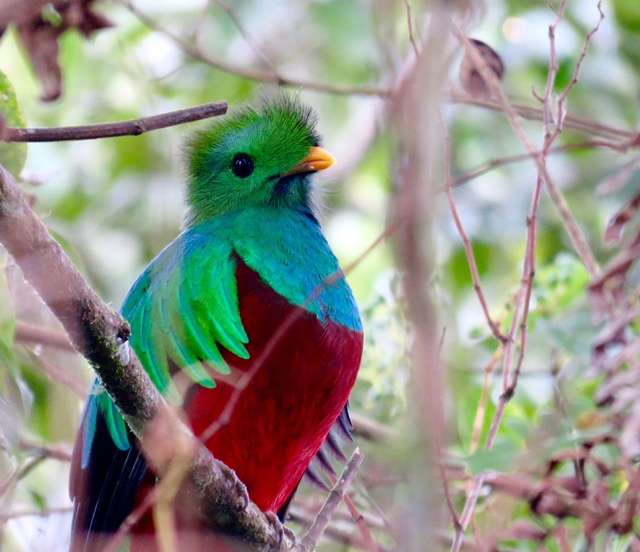
November 12th HEADING FOR THE OSA PENINSULA
After a short morning birding session with the boys and a long, but eventually successful wait for White-tailed Emerald, it was time to say goodbye. We dropped Harry, Maurits and Pieter off at the bus station for their journey to the Playa Tamarindo and Pieter and I headed south towards the remote Bosque del Rio Tigre Lodge at the Osa Peninsula. The last three days were a lot of fun and I will miss you guys.
While heading south Pieter and I made a couple of scheduled stops. The first one for Turquoise Cotinga at the small Los Cusingos reserve. Unfortunately we only saw two birds flying overhead, so I was sincerely hoping that we would find one along the road while driving south. Our next stop was at Finca los Suisos to look for the uncommon near endemic Golden-naped Woodpecker. This bird proved less elusive and we got splendid looks at a pair high up in a dead tree.
After lunch we continued our way south and soon we entered the very scenic Osa Peninsula, one of the largest continues tracks of lowland forest in Central America. This was evident by regular sightings of Scarlet Macaw. A species that needs good forest for nesting.
While driving Pieter and I suddenly noticed a largish passerine on an exposed snag in the canopy. Could it be? Yes! Moments later we had fantastic views of a male Turqoise Cotinga through the scope!
As darkness fell over the Osa Peninsula we arrived at Bosque del Rio Tigre Lodge. What an amazing place in the middle of the jungle. We got a warm welcome from the owners Liz and Abraham and while having a beer we got an introduction to the place from Liz. The rooms deliberately have one open wall so only a mosquito net separates you from the rainforest around you. Lovely, for me there is no better background noise than the sounds of the jungle to fall asleep with.
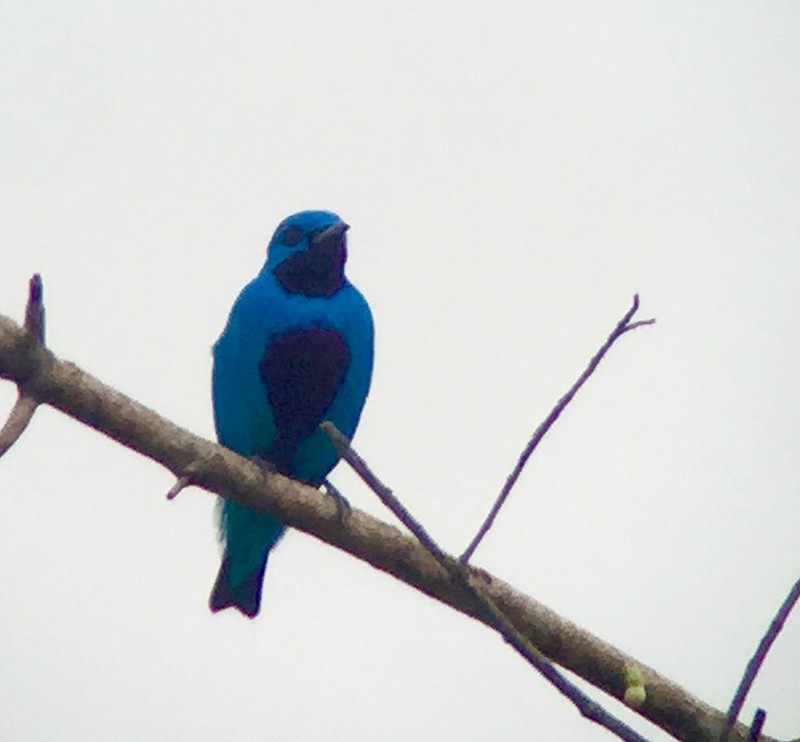
November 13th TARGET BIRDING 2.0
Besides being one of the owners of Bosque del Rio Tigre Lodge, Abraham is also a very good local guide. He had the tough job of showing us about ten big target species in a single morning, since Pieter and I had to catch a flight to San José at 1:30 PM.
Immediately after our coffee we headed towards the Rincon Bridge to look for my most wanted bird here, the immaculately white Yellow-billed Cotinga. This incredible bird is severely threatened by habitat loss since it needs mangroves with adjacent tropical lowland forest. An increasingly rare combination following continuing development along the Central American Pacific coast. We were incredibly lucky. Immediately upon arrival at the bridge we saw a male Yellow-billed Cotinga flying into a tall tree and after jumping out of the car we had fantastic views through the scope. Two beautiful rare cotingas within 24 hours, not bad at all.
Next up was a stretch of mangroves where we looked for the endemic Mangrove Hummingbird, which we found remarkably quickly. So at 8 AM we were already back at the lodge with the Cotinga, the Hummingbird and a bonus Fiery-billed Aracari and Bronzy Hermit in the bag.
In the half hour till breakfast we found every other needed target, from the flashy Orange-collared Manakin to the Black-hooded Antshrike. There was one bird however that had to be the difficult one, the Black-cheeked Ant-Tanager. By 11 AM this virtually guaranteed bird still hadn’t showed up at the feeders and Pieter and I were getting seriously worried. By 11:30 we decided to give the bird one more try along the trail system, but while we were half way up the trail we suddenly heard Liz screaming from down below that the birds were on the table! We raced down, had amazing views of a family of Black-cheeked Ant-tanagers, packed our bags, raced to the airport and made our flight in time. Perfect timing.
At the airport we were greeted by a fresh new car from Adobe Rental Cars and top Costa Rican birder and guide Herman Venegas and together we headed for Monteverde, where we arrived late in the evening at the luxurious Hotel Fonda Vela.
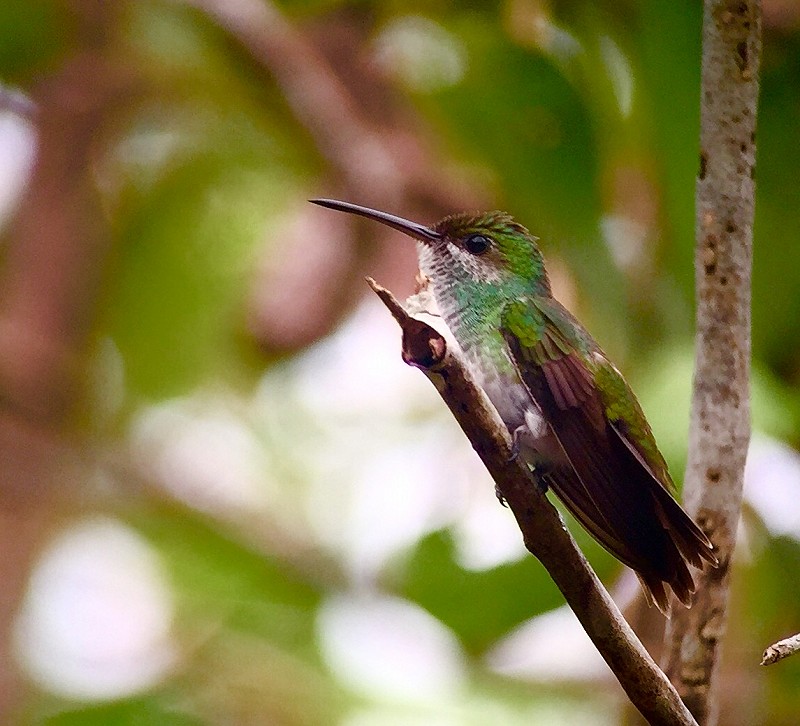
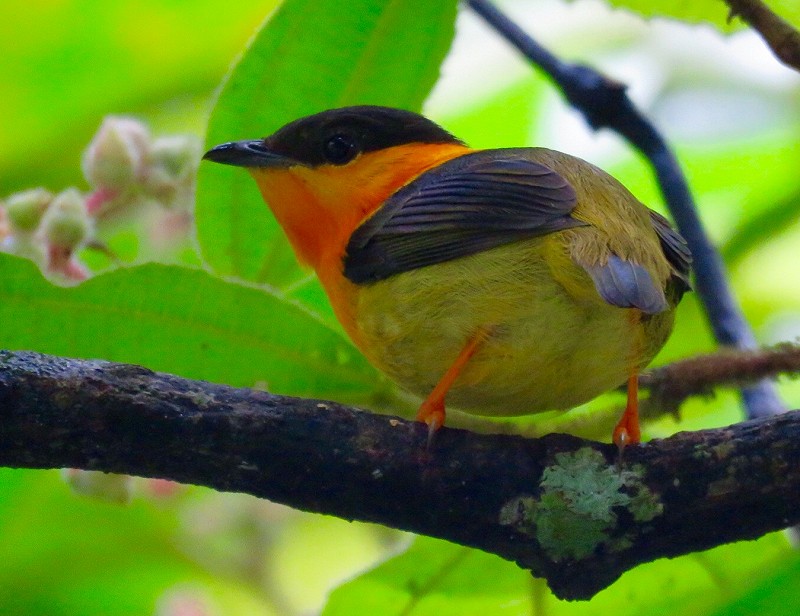
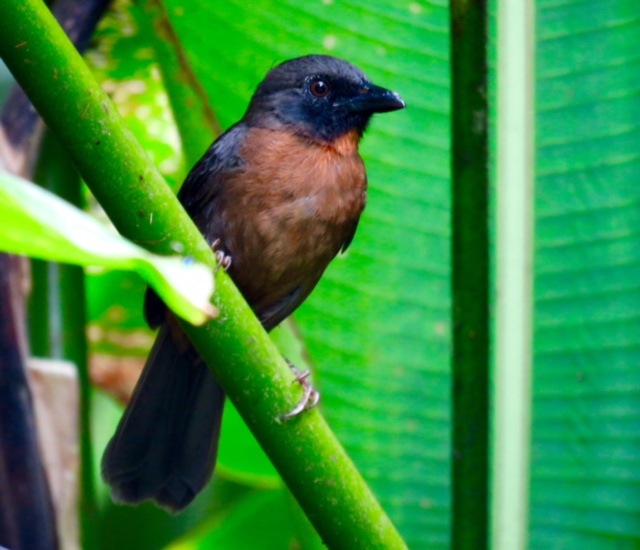
November 14th MONTEVERDE
Today we joined forces with local guide Marcos Mendez of Passion Costa Rica. Since he is birding almost every day in Monte Verde he knew exactly where to go. We started our morning at Sanctuario Ecologico to look for a notoriously difficult bird, the elusive Chiriqui Quail-Dove. We split up and slowly tracked down the trail system. Half an hour later it was bingo, when Herman and I stumbled upon a very showy individual.
After that early success we spent the rest of the morning at Curi-cancha Reserve, one of Monteverde's finest birding sites. Despite being crowded with tourists, especially in the high season, birds do not seem to mind that much and actually a lot of them have grown rather accustomed to people. At the feeders we saw my last possible Costa Rican endemic, the Coppery-headed Emerald and higher up in the elfin forest we had close encounters with Prong-billed Barbet, Orange-bellied Trogon (now lumped with Collared Trogon), Black-breasted Wood-Quail and an obligating juvenile Barred Forest-Falcon.
We had lunch at Santa Elena Reserve, where we also tracked down my last new species at Monteverde, the Streak-breasted Treehunter. After that Herman, Pieter and I drove towards the famous Arenal Observatory Lodge, where we arrived around 9 PM.
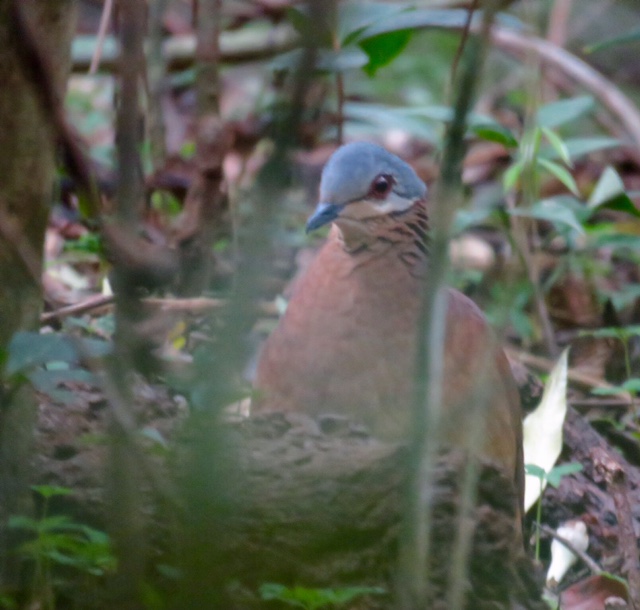
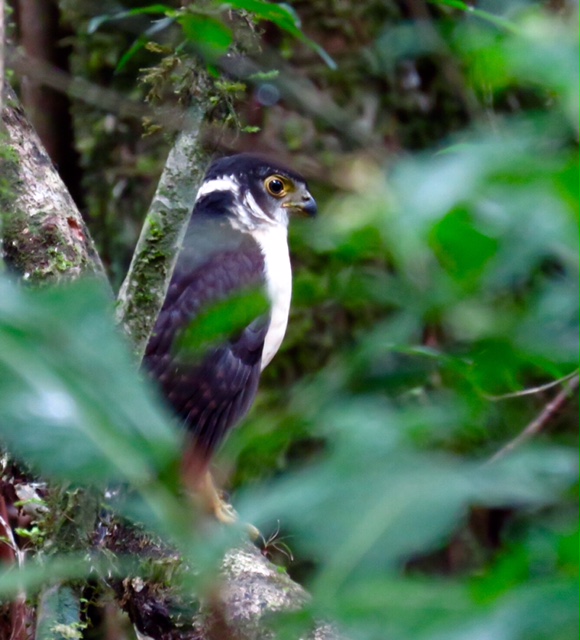
November 15th BELLBIRDS!
While having coffee at the Arenal Observatory Lodge we were treated to a family of Great Curassows at the feeders. Amazing! Back home in the Netherlands I will have to settle again with feral Rose-ringed Parakeets and the occasional Chaffinch.
This morning we were joined by Arenal's best local guide, Christian. With him we set out to look for some difficult birds. Early on we were successful, as we were rewarded with excellent views of Thicket Antpitta, a notoriously skulking species.
On the trails we soon found a large flock that held two of our main targets, the Streak-crowned Antvireo and even better, a White-throated Shrike-Tanager!
The highlight of the morning was still to come. For the last week Christian had been hearing Three-wattled Bellbird in the valley behind one of the cabins. For me this was one of my most wanted birds in Costa Rica and since they are not at Monteverde this time of the year I was definitely not expecting to see any. As we arrived at the spot we already heard a bird calling very distantly from somewhere in the valley or on the distant slope opposite us. Where exactly the sound was coming from, was hard to say. I started scanning with the scope and behold, 15 minutes later I found four Bellbirds together on top of a tree at three kilometres distance! This would never have been possible without my Swarovski ATX65 telescope with swarovision. Thanks again, Vogelinformatiecentrum Texel and Swarovski Optik, for sponsoring me this awesome equipment!
After packing our bags we drove down to Herman and Pieter's stakeout for the rare Keel-billed Motmot, which we luckily found incredibly quickly. After that we headed to the Bogarin feeders, where we had close encounters with a family of White-throated Crakes and several calling Uniform Crakes.
After driving for two more hours we arrived at La Selva Biological Station in the Caribbean lowlands, just in time to track down the range restricted Nicaraguan Seed-Finch.
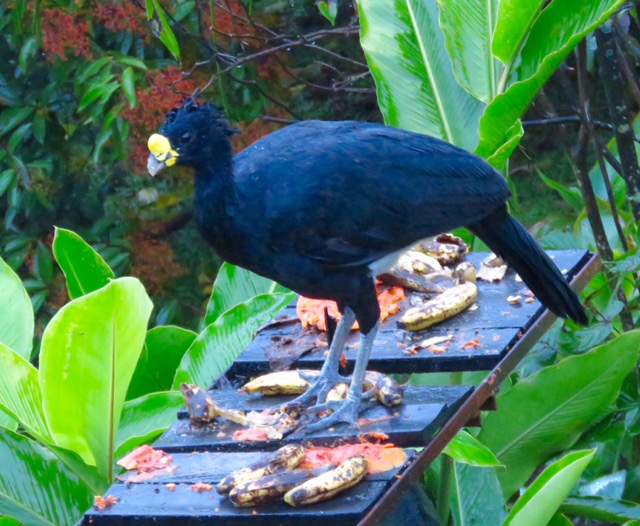
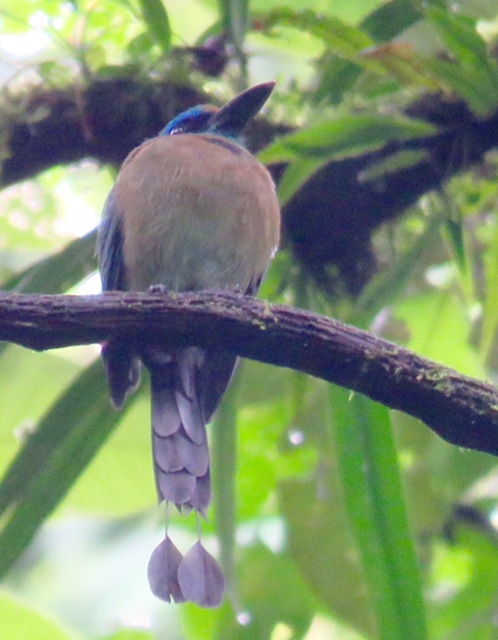
November 16th GOODBYE BEAUTIFUL COSTA RICA
Sadly this was already my last day in Costa Rica. I had an incredible time thanks to Pieter Westra of Aratinga Tours. The logistics, the guiding, the birds, all was just absolutely top-notch. He had persuaded several of Costa Rica’s top birders to join during several stages of the trip, which resulted in a very impressive list of species. Thanks to all you guys for helping me out in your wonderful country, your hospitality was overwhelming. And of course thanks to Adobe Rent a Car for sponsoring us your cars this whole week!
For this last morning at La Selva Pieter, Herman and I were joined by two of La Selva’s best guides, local legend Lenin and one of his sharp fellow young local guides.
Within a couple of hours we found Rufous-winged and Chestnut-colored Woodpecker and several other additions to the list. Snowy Cotinga did not cooperate, so I will have to come back one day for that stunning species, which is not a punishment at all!
Later on, we drove up to the La Paz Waterfall Gardens, but en route we had lunch at a wonderful small restaurant with hummingbird feeders, which resulted in White-bellied Mountain-Gem. More unexpected was a Black-tighted Grosbeak, brilliantly found by Herman on call.
La Paz Waterfall Gardens had generously offered us free access, which was a good thing since here we saw another two Costa Rica/Panama endemics, Black-bellied Hummingbird and the uncommon Sooty-faced Finch.
At the airport I said goodbye to Pieter and Herman and headed for Guatemala!
Arjan Dwarshuis
PLEASE MAKE A DONATION NOW!
world.observation.org/arjan
www.arjandwarshuis.com/#biggestyear
Discussie
Jurgen van der Meer
·
25 November 2016 15:16
Prachtig verslag weer. Herinnert mij pijnlijk aan een ochtendje zwemmen bij Corcovado zonder camera waarbij Black-cheeked Ant-Tanager en Scarlet Macaw zich van hun prachtigst lieten zien in kale bomen en vol zonlicht.....
Gebruikers van het forum gaan akkoord met de forumregels.

